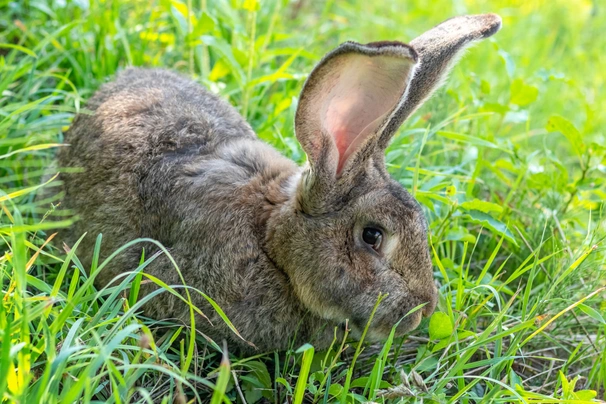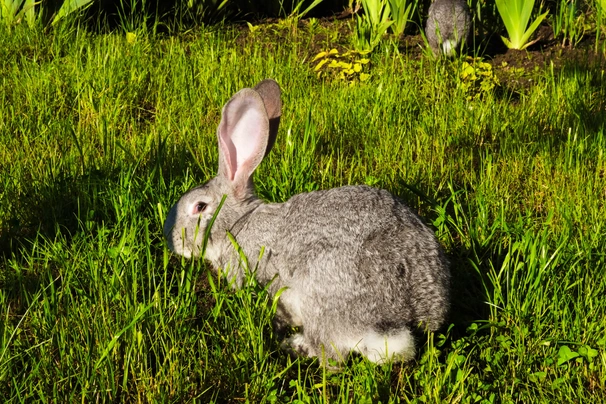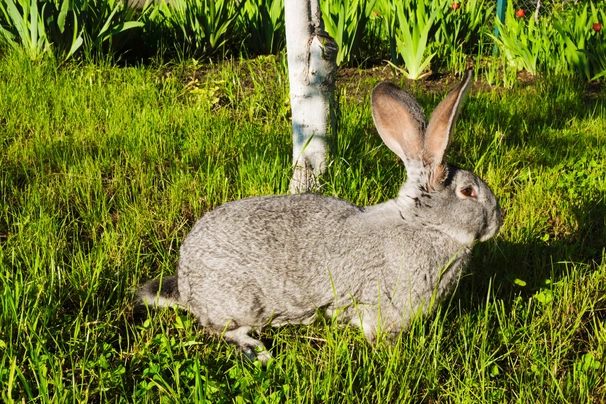British Giant
Introduction of the British Giant
The British Giant is a larger rabbit that has its heritage in the Flemish Giant – a breed that originates in Belgium. This is one big bunny – the British Giant can grow up to 7kg and often rivals a small dog in size. The breed makes the perfect house rabbit and will live very happily alongside cats, dogs and children.
The British is not a particularly active animal and will be more than happy to lie around watching the world go by. If he’s handled early and regularly enough, he will become very affectionate and will love nothing more than a snuggle with his owner.
History of the British Giant
The British Giant first appeared in the UK in the 1940s when breeders developed a new type using Flemish Giant stocks brought over from America. In Britain the Flemish Giant is only accepted in one colourway – steel blue – so when other colours came into the country from the US, attempts were made to breed from them in order to create a giant rabbit that would be accepted in a number of attractive colours.
The British Giant is a little smaller than its Flemish cousin, but apart from that, shares many of the same characteristics although it is accepted in many more colours. The British Giant is not popular outside the UK and is almost unheard of elsewhere.
Appearance of the British Giant
- Main colourways: black, blue, white, opal, steel grey
- Average weight: 5.5 – 7kg
The biggest of all the British breeds, the British Giant has a large, powerful body that’s flat across the back and has a wide front and hindquarters. His fur is medium length, dense and soft and comes in a variety of colours including white, sable, opal, grey, blue and black. He will need regular grooming to keep his fur in tip-top condition and prevent it from becoming matted.
The face is broad and round, with full cheeks and he has large ears that are held erect.
Temperament of the British Giant
The British Giant is docile, gentle and amenable. He will live easily with people and other animals providing he is introduced early enough and will quickly become a much-loved member of the family thanks to his affable nature.
Despite their size, British Giants are generally not very active. They love playtime, but their energy is not boundless, unlike other rabbit breeds. They love affection and will enjoy human interaction, but they are just as happy snoozing or stretching out and watching the action rather take part in it.
The British Giant is calm and friendly and very good natured and because of this they make fantastic pets. They are particularly good rabbits to have around children, as their even temper means they can put up with handlers who might not be as confident as others, although children should be taught how to behave around rabbits before you bring him home. This breed is powerful and could cause injury if startled or handled roughly as he may kick out, the British Giant is not generally aggressive though.
Health of the British Giant
Although the British Giant is a generally hardy breed, there are some problems associated with it because of its sheer size. Back problems and sore feet are just two examples of issues that can arise, and the breed also has a tendency towards obesity. An overweight rabbit is one that will be unable to groom or care for itself and may become susceptible to fly strike. A rabbit that’s allowed to become dirty or that cannot clean itself can attract flies, which will lay their eggs in the soiled areas. The maggots which hatch can cause wounds in the rabbit’s skin, which will be very sore and may become infected. Unless you are very experienced in keeping and managing rabbits, flystrike will require veterinary intervention. Keep your rabbit at the correct weight and you can help prevent flystrike.
The biggest threat to your rabbit’s health is from dental problems. Rabbits’ teeth grow constantly and can quickly become overgrown if they’re not worn down with gnaws and the correct diet. Feed your pet plenty of fibrous green vegetables and high-quality hay that take a lot of chewing and his teeth will be better for it. If his teeth are not cared for correctly he could develop overgrown molars or enamel spurs, both of which can make eating difficult and may caused injury to the tongue and cheeks which again, can easily become infected. If he goes off his food, develops watery eyes or becomes lethargic it would be well worth having his teeth checked by a vet.
Caring for the British Giant
As such a large rabbit the British Giant needs a home that offers plenty of space. He will live in a hutch quite happily, but it will be need to be of an appropriate size. A dedicated shed or Wendy house may be better. If he’s going to live outdoors then he should be kept out of the wind and full sun and if he’s in a hutch, it should be fully water and weatherproof. He should also be provided with a run or secure area of garden he can explore and sunbathe in safety.
The British is one of the best rabbits to keep indoors as he’s calm, affectionate and good-natured and will quickly make friends with everyone – other pets included. Rabbits have an undeniable urge to chew which will extend to skirting boards, shoes, toys and anything else that you may not want biting. A particular favourite seems to be cables, so it’s wise to keep everything you treasure out of his way, or keeping him away from anything that would be dangerous if chewed.
If he is going to live indoors he should be provided with a ‘safe’ area – a cage or quiet room where he can rest undisturbed. A dog crate with a plastic bottom is ideal for this. He will also appreciate a selection of toys to play with. Wooden and rattan gnaws are always appreciated, as is anything that makes a noise such as toss toys with bells and wooden rattles.
He can and should be trained to use a litter tray. By observing where he likes to go to the toilet and placing a tray in this area he will quickly learn to use it. Wood pellet-based litter is preferable to clay litter as some rabbits can react adversely to the clay or may try to eat it.


